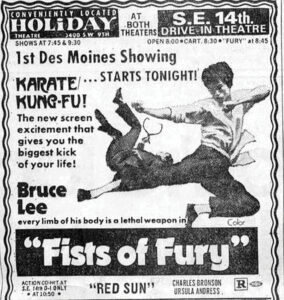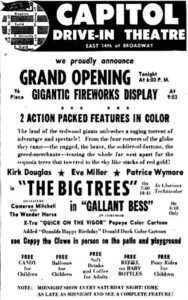The Blank family’s roots in Des Moines theater
5/3/2023 I write a lot about movies, including my experiences making them or my experiences watching them. Des Moines’ film history fascinates me, from the insane Evangelical Apocalypse films of Russell Doughten and Donald W. Thompson to Iowa’s own Cinema Paradiso story with the Bev Mahon’s Varsity Theatre. Before all the major chains took over the exhibition market, there were Fridley Theaters. And before them, there was Central State.
I write a lot about movies, including my experiences making them or my experiences watching them. Des Moines’ film history fascinates me, from the insane Evangelical Apocalypse films of Russell Doughten and Donald W. Thompson to Iowa’s own Cinema Paradiso story with the Bev Mahon’s Varsity Theatre. Before all the major chains took over the exhibition market, there were Fridley Theaters. And before them, there was Central State.
Central State was founded by A.H. Blank, a Romanian whose family immigrated to the United States in 1890 when the family settled in Council Bluffs. Early on in his career, he worked in Omaha as a balloon and novelty salesman. He was also a carnival barker at the Trans-Mississippi Exposition in 1898. The carny showman lifestyle was in his blood, which made the Blank family members great salesmen.
A.H. Blank opened his first theater with Abe Frankel to benefit from the foot traffic of trolley riders during their commutes. Frankel was also a carny of his own, as one of his other ventures is the now-gone Riverview Park. Blank and Frankel opened the Casino Theater together on Locust Street, between The Garden Theater and The Family Theater. This was back when Des Moines was flooded with stage and movie theaters from the early 1900s. Not all theaters were playing movies back then. Some would run newsreels exclusively, and people would pop in to catch news about Drake University’s sporting events or reports from Washington, D.C.
 They first named the company Tri-State and then later Central State Theatre Corporation and, rightfully so, as they were in the heart of Iowa. Their competition consisted of local guys, the legendary RKO Picture Company (which produced “King Kong”) and Paramount Pictures. Back then, movie companies were able to monopolize the entire industry. They would produce movies and then distribute them to their own theaters. This made it difficult for small theater operators to compete. Imagine if Disney owned their own movie theaters, and the only way to see a new “Star Wars” movie would be at a Disney-owned-and-operated movie theater. Thankfully, on May 4, 1948, the U.S .Supreme Court voted to dismantle the Hollywood Studio System. In United States v. Paramount, the court found the studios had violated anti-trust laws, which was a devastating blow to five major studios and three smaller ones. This opened the wild west of movie exhibition in the United States.
They first named the company Tri-State and then later Central State Theatre Corporation and, rightfully so, as they were in the heart of Iowa. Their competition consisted of local guys, the legendary RKO Picture Company (which produced “King Kong”) and Paramount Pictures. Back then, movie companies were able to monopolize the entire industry. They would produce movies and then distribute them to their own theaters. This made it difficult for small theater operators to compete. Imagine if Disney owned their own movie theaters, and the only way to see a new “Star Wars” movie would be at a Disney-owned-and-operated movie theater. Thankfully, on May 4, 1948, the U.S .Supreme Court voted to dismantle the Hollywood Studio System. In United States v. Paramount, the court found the studios had violated anti-trust laws, which was a devastating blow to five major studios and three smaller ones. This opened the wild west of movie exhibition in the United States.
In 1948, Central State opened the Southeast 14th Street Drive-In. It had a 600-car capacity, and they opened with the Marx Brothers in “A Night in Casablanca.” Obviously, winters were a challenge and so were daytime hours. Theater operators had to get clever with how they made money during those times. In 1952, Central Sate opened the Capitol Drive-In on N.E. 14th at N.E. Broadway Avenue. They opened with a double feature of “The Big Trees” with Kirk Douglas and “Gallant Bess” with Cameron Mitchell. It could hold 728 cars, had mid-century modern styling with patio seating at the concession stand, and had electric in-car heaters.
The company expanded its business outside of Des Moines and into Cedar Rapids and Iowa City. By the 1950s, Central States Theaters owned and operated more than 100 theaters in Iowa, Nebraska, Kansas and Missouri.
A.H.’s son, Myron, took his place with Central State. In the 1950s, Myron Blank was instrumental in convincing major studios to release their films on a wide basis rather than in a limited number of theaters. This helped to make movies more accessible to the public, and it also helped to boost box office receipts.
Myron Blank was also one of the first theater owners to realize that television could be a threat to the movie business. However, he also saw that television could be an opportunity for theaters. Blank began to experiment by showing television programs in his theaters, and he eventually created a network of theaters that showed television-only programming. This network, known as Tele Theatres, helped to keep Blank’s theaters afloat during the difficult years of the early 1950s.
A.H. Blank passed away in 1971, and Myron Blank did in 2005. Today, we continue to see the Blank name all over this city. A hospital, a zoo, and multiple parks all carry the Blank name as the family members were significant philanthropists. Even so, not many residents know that their success was in movie exhibition.
If you want to learn more, I recommend checking out Mark Heggen’s documentary, “Lost Cinemas of Great Des Moines,” as it provides the deepest dive on old movie houses in the area. ♦
Kristian Day is a filmmaker and writer based in Des Moines. He also hosts the syndicated Iowa Basement Tapes radio program on 98.9 FM KFMG. Instagram: @kristianday Twitter: @kristianmday


















